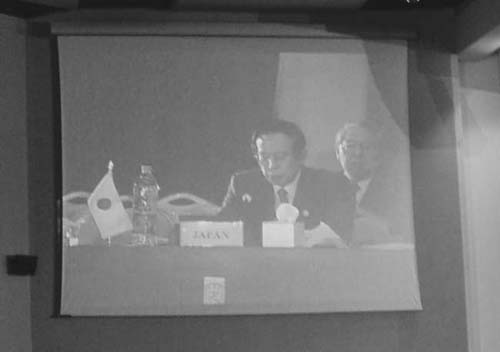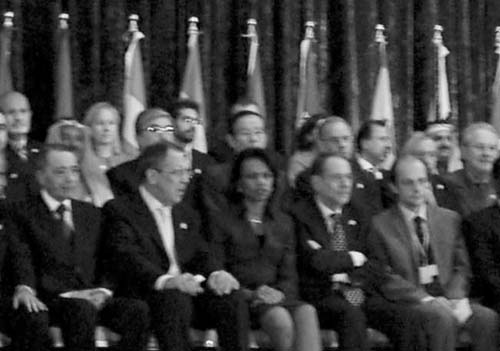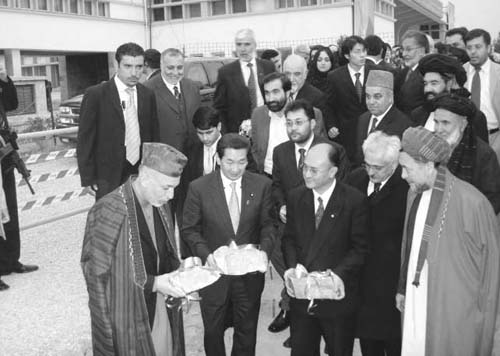Japan's Official Development Assistance White Paper 2006
Main Text > Part II ODA DISBURSEMENTS IN FISCAL YEAR 2005 > Chapter 2 Details about Japan's ODA > Section 3. Assistance for Each Region > 5. Middle East
5. Middle East
Japan's bilateral ODA to the Middle East in 2005 was approximately US$3,479.22 million, 33.2% of total bilateral ODA.
Peace and stability of the Middle East is crucial, directly linked to the peace and stability of the entire international community, since the Middle East is the world's major energy supplying region. Japan is dependent on it for more than 90% of its imports of crude oil. The reconstruction of Iraq and Afghanistan is extremely important for avoiding destabilization of the Middle Eastern region as a whole. Japan continues to provide active support to these countries in collaboration with the international community. Also, the peace and stability of the region will not be achieved unless progress is made in the Middle East peace process. For the progress of this peace process, Japan intends to continue actively assisting the peace efforts of both Israeli and Palestinian sides. From this perspective, Japan has been actively providing assistance to the Palestinians. Furthermore, in January 2006 the then Prime Minister Junichiro Koizumi visited Turkey, which is an important country in a geopolitical sense as well, as the first incumbent Japanese prime minister to visit the country in 15 years. He agreed with his counterpart to strengthen Japan-Turkey relations, which have spanned more than a century, as well as to expand cooperation for various issues facing the international community, including the peace and stability of the Middle Eastern region.
Chart II-30 Japan's Assistance Disbursements in the Middle East

The economic situations of Middle Eastern countries vary from oil producers with high incomes, to LDCs with low incomes. The high development needs in low- and middle-income countries present a challenge, as does the need to break away from an excessive dependence on oil and to diversify the economy in high-income, oil-producing countries. Human resource development such as the fostering of technical workers represents a significant challenge shared within the region. Moreover, in the Middle Eastern region where water resources are scarce the securing and management of water is an important challenge which has the potential to affect regional stability.
Japan provides numerous types of assistance based upon this recognition. These include "consolidation of peace" assistance (in Iraq, Afghanistan, the Sudan) for the social stability and economic growth of the Middle East, and cooperation for Middle East peace process (assistance to the Palestinians, and the surrounding Arab countries, etc.). Other examples include assistance for building economic and social infrastructure and reducing poverty in low- and middle-income countries, as well as assistance for the comprehensive management of water resources, for fostering human resources tailored to the needs of each country, and for environmental conservation measures.
At the G8 Sea Island Summit in June 2004, the Broader Middle East and North Africa (BMENA) Partnership was announced to support the reform efforts of the Middle Eastern countries. Taking into consideration the employment issue, which is a serious problem for many of the Middle Eastern countries, Japan asserted the importance of vocational training. The Forum for the Future was established as a forum for foreign minister-level talks among the G8 and BMENA countries. Following its first meeting held in December 2004 in Morocco, the second meeting was held in November 2005 in Bahrain. Senior Vice-Minister for Foreign Affairs Katsutoshi Kaneda attended from Japan and introduced efforts such as the Workshop on Technical and Vocational Education and Training (TVET) which Japan co-hosted with Jordan in September 2005. In addition, he expressed Japan's intention to continue to advance active assistance in the future for human resources development within the region, including assistance to women. In order to assist women, Japan began new efforts in FY2005 such as the introduction of maternal and child health handbooks in Palestine and assistance to female entrepreneurs in Saudi Arabia.


Foreign Affairs Senior Vice-Minister Katsuhito Asano attending the Forum for Future
For assistance to the Middle East peace process, Japan has provided more than US$870 million to the Palestinians since the current peace process began in 1993. Following the death of Chairman Yassar Arafat, Mahmoud Abbas was elected president in January 2005 in democratic elections. From the perspective of supporting the realization of the "two-state solution" with the co-existence and co-prosperity between Israel and Palestine, Japan has provided consistent assistance for the peace efforts of President Mahmoud Abbas. On the occasion of his visit to the Palestinian territories and Israel in January 2005, the then Foreign Minister Nobutaka Machimura announced that Japan would provide support to the Palestinians for the development of a self-sustained economy, in addition to the aid which had already been offered in the three main areas of humanitarian, reform, and confidence-building assistance. Under this policy, following Japan's decision to extend the additional US$60 million in assistance in February 2005, on the visit of President Mahmoud Abbas to Japan in May 2005, Japan announced its intention to provide approximately US$100 million for the immediate future. Japan decided upon assistance totaling US$50 million implemented through UNDP and UNRWA to stabilize civilian life after Israel's withdrawal from the Gaza Strip in September 2005. In addition to the assistance through the international organizations, since the autumn of the same year Japan has been providing cooperation for the designing of a regional development plan which is primarily focused on the West Bank, Jericho area. Japan has also implemented technical cooperation projects in the fields of local governance, maternal and child health, and waste management in this area.
In January 2006, Hamas, which does not recognize the existence of Israel and has advocated a course of armed struggle, won a majority of seats in the Palestinian Legislative Council elections. Following the formation of a Hamas-led cabinet at the end of March 2006, how assistance to the Palestinians should be provided has become a significant challenge to the international community. Japan continues to provide humanitarian assistance from the viewpoint of preventing further deterioration in the livelihood of the Palestinians and thus, strengthening peace-oriented public opinion. In March 2006 Japan has decided to extend food aid through UNRWA and WFP. Additionally, the then Prime Minister Junichiro Koizumi, on the occasion of his visit to the Palestinian territories in July, announced assistance of US$30 million. The assistance included assistance to strengthen the function of the presidential office in support of the President's efforts, as well as humanitarian and other types of assistance. In addition to the above projects, he proposed the concept for creating the Corridor for Peace and Prosperity to materialize the prosperity of the region through regional cooperation among Israel, Jordan, and the Palestinian authority, which was agreed upon by the parties concerned.
In terms of major projects to Middle Eastern countries approved for financial cooperation in FY2005, there were six projects in total with new provisions of yen loans. These were the Kuraymat Integrated Solar Combined Cycle Power Plant Project in Egypt; the Borg Cedria Science and Technology Park Development Project and the Photovoltaic Rural Electrification and Water Supply Project in Tunisia; and the Sewerage System Development Project, the Rural Electrification Project (III), and the Marrakech-Agadir Motorway Construction Project in Morocco.
For Iraq, an agreement was reached in 2004 at the Paris Club that 80% of Iraq's Paris Club debt would be cancelled in three stages. Following this agreement Japan signed a bilateral agreement in November 2005 which would reduce Iraq's total debt owed to Japan of roughly US$7.6 billion by 80% in three stages. In terms of grant aid, Japan decided on the implementation of the Project for Construction of Diesel Power Station in Al-Samawah in Iraq, Road Sector Programme Grant Aid for Afghanistan, and the Project for the Improvement and Expansion of the Water Supply Networks in North/Middle Jordan Valley in Jordan.

Foreign Affairs Vice-Minister Masakazu Sekiguchi attending the inauguration ceremony of an airport in Afghanistan


 Next Page
Next Page